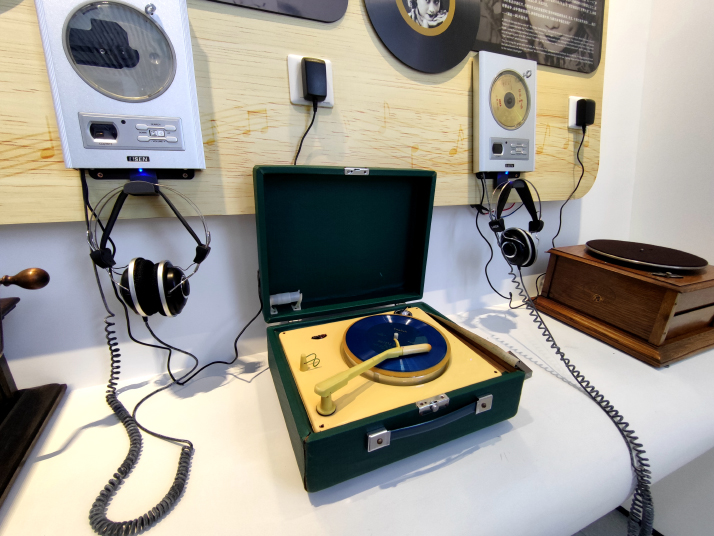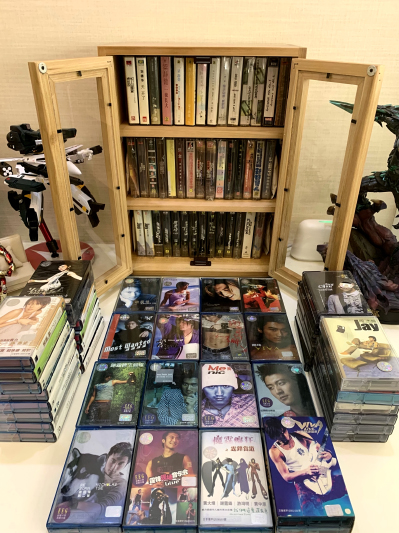| Lifestyle |
| Retro and vintage vessels for recording music hold a special place in the hearts of many | |
|
|
 Vinyl record players on display at a museum in Zhongshan, Guangdong Province, in September 2023 (LU YAN)
Xing Xing, an IT industry professional from Wenzhou, Zhejiang Province, has amassed nearly 400,000 followers on Bilibili, China's equivalent of YouTube that primarily caters to Gen Z. During his free time, Xing uploads videos of his cassette players playing songs, mostly popular hits from the 1990s to the 2000s. Born in the 1980s, Xing developed a love for music from a young age. "As I grow older, these cassette tapes serve as vessels for preserving my youth," he told Beijing Review. "In fact, I create these videos as a way to commemorate the bygone days. If someone shares the same sense of nostalgia, that's even better." As he hoped, Xing's videos have garnered attention from audiences with similar tastes and interests. Many people regard his Bilibili account as a broadcasting channel and request songs, while others share their thoughts on music recording formats such as cassette tapes, vinyl records, and CDs, which have become less common in recent decades. Despite the widespread use of digital streaming, physical music storage formats still enjoy popularity among small groups of people in China and around the world. These individuals are keeping these old technologies alive and kicking. Sounds of the past Although unfamiliar to many young people, such as Gen Z and Generation Alpha, physical music storage formats were all the rage in the past. The origins of vinyl records can be traced back to the late 19th century when Thomas Edison introduced the phonograph. However, it wasn't until Emile Berliner invented the flat disc record, known as the "gramophone," in 1887 that recorded music truly began to flourish commercially. About two decades later, vinyl records and players made their way to China. The compact cassette format was introduced by Dutch electronics company Philips in the early 1960s, and cassette tapes enjoyed a golden age in the 1970s as music lovers embraced them as a convenient way to listen to their favorite albums, leading to a surge in sales. In the late 1980s and early 1990s in China, when television programming was limited, cassette players became vital entertainment equipment, especially for the younger generation. Listening to music on cassette players, dancing and getting their hair permed were the "three must-dos" for trendsetters at that time. School students exchanged cassette tapes as a means of closer interaction. This period also marked a boom in the music industry, with many songs from that era remaining popular to this day. Xing recalled having a domestically produced dual-cassette recorder at home when he was a child. Like many people of a similar age, cassette tapes accompanied him throughout his childhood and youth. He received his first Walkman, under the pretext of using it to study English, when he was in junior high school. Years later, while cleaning up his old house, he stumbled upon the cassette tapes he had purchased during his student days. He held onto them and, in 2020, started his Bilibili account. "Currently, I have about 1,000 tapes. A few of them were retained from my student days, but most were purchased from secondhand websites, which is a great way to find a variety of music," Xing said. "I thought about introducing today's children to the way we used to listen to music in our time, so I recorded my first video." Xing believes that cassette playing and collecting only has the potential for a small-scale revival because, like other older methods of storing music, cassettes have cost and portability disadvantages compared to digital music. However, his way of sharing music has unexpectedly gained popularity. A single video of a cassette playing can garner nearly 2 million views. Thousands of people have left comments about how these songs remind them of their old days or have sparked discussions and critiques among viewers. Some viewers request songs to express their love to someone they admire. One viewer, who was struggling with depression, found comfort in watching Xing's videos. "In this unique way, music comes to the rescue, bringing joy to me and a wider audience," Xing said.  Some of the cassettes in the collection of Xing Xing, an IT industry professional from Wenzhou, Zhejiang Province Vinyl record players on display at a museum in Zhongshan, Guangdong Province, in September 2023 (COURTESY PHOTO)
More than music The return in popularity of physical music formats has sparked a resurgence of interest among older generations who want to relive the nostalgic experience of listening to music on vinyl records, cassette tapes and CDs, and also among the younger ones who consider these formats retro and cool. Record stores, cafés and community events dedicated to these formats are thriving, becoming vibrant hubs where people connect, discover new music and share their love for older music formats. "Tangible forms of music can connect people," Wu Xiran, owner of a café in Dalian, Liaoning Province, told Beijing Review. As a vinyl enthusiast, Wu has combined his café with a record store where customers can enjoy music while having a drink, and can also purchase cassette tapes, vinyl records and CDs to take home. A couple of years ago, Wu started hosting regular gatherings at his café for people with similar musical interests to socialize and share ideas. These gatherings usually attract up to 10 attendees. "It's an exciting experience to see that there are still many people passionate about physical music formats," Wu said, adding that the café and events have also attracted others to take an interest in cassette tapes, vinyl records and CDs. "I'm delighted to see the community constantly growing, with old music formats influencing an increasing number of younger people." Collaborations between musicians, music enthusiasts, and organizations have also demonstrated the power of music to bring people together and make a positive impact on society. In 2020, an inspiring initiative unfolded as 28 musicians and bands collaborated on a project to release two music compilation cassette tapes, which were made available for sale online. All proceeds from the sales were donated to 590 Pets, also known as the Wuhan Small Animal Protection Association, a philanthropic nongovernmental organization located in Wuhan, Hubei Province. Priced at 60 yuan ($8.33) for a single tape and 100 yuan ($13.89) for a set of two, the unexpected response from supporters led to the swift sell-out of all 650 sets of tapes shortly after their release. (Print Edition Title: Memory Recorders) Copyedited by G.P. Wilson Comments to luyan@cicgamericas.com |
|
||||||||||||||||||||||||||||||
|